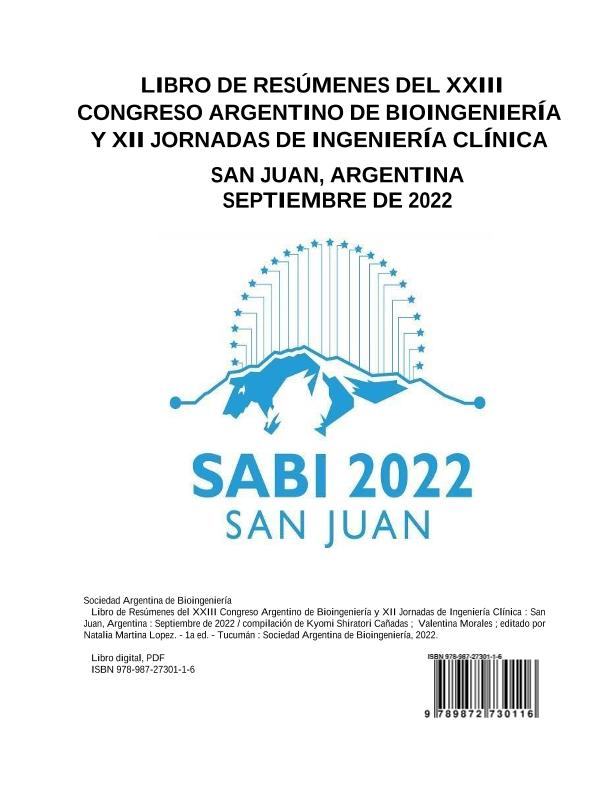Evento
Human amniotic membrane is widely used in regenerative medicine (ophthalmology, dermatology, reconstructive surgery, soft tissue augmentation, and dentistry) and tissue engineering. It is an immuno-compatible tissue that has immunomodulatory, antimicrobial and no mutagenic effects and is also a source of growth factors and cells with stem cell properties that combines adequate mechanical properties with a good capacity for cell adhesion for to the structural components of the extracellular matrix. Several methods are currently used to prepare, store, and sterilize human amniotic membrane allografts that may affect safety and biological properties. The aim of this work was to obtain, at Banco de Tejidos del Laboratorio de Hemoderivados, Universidad Nacional de Córdoba, human amniotic membrane allografts preserved by two methods, cryopreservation and the combination of lyophilization and irradiation. Subsequently, biocompatibility was evaluated using the cytotoxicity, direct irritation and systemic toxicity tests recommended by ISO 10993:5, 10993:10 and 10993:11, respectively. The results showed that the processing method and the different methods of conservation of the amniotic membrane (cryopreserved and lyophilized and irradiated) were adequate. In the cytotoxicity test, both amniotic membranes, showed cell viability greater than 70% according to ISO 10993:5. In addition, no negative evidence was observed in the primary irritation score on the skin, nor there were changes in body temperature due to the systemic administration of the extracts at the different times tested. The allografts obtained and preserved both by cryopreservation and by the combination of lyophilization and irradiation reveal a good profile that makes their use in regenerative medicine and tissue engineering very promising. La membrana amniótica humana es ampliamente utilizada en medicina regenerativa (oftalmología, dermatología, cirugía reparadora, aumento de tejidos blandos y odontología) e ingeniería tisular. Es un tejido inmunocompatible que presenta efectos inmunomoduladores, antimicrobianos y antimutagénicos y, además, es una fuente de factores de crecimiento y células con propiedades de células madre que combina adecuadas propiedades mecánicas con una buena capacidad de adhesión celular gracias a los componentes estructurales propios de la matriz extracelular. Actualmente se emplean varios métodos para preparar, preservar y esterilizar aloinjertos de membrana amniótica humana que pueden afectar la seguridad y propiedades biológicas. El objetivo de este trabajo fue obtener, en el Banco de Tejidos del Laboratorio de Hemoderivados de la Universidad Nacional de Córdoba, aloinjertos de membrana amniótica humana preservados por dos métodos, la criopreservación y la combinación de liofilización e irradiación. Posteriormente, se evaluó la biocompatibilidad mediante los ensayos de citotoxicidad, irritación directa y toxicidad sistémica recomendados por la ISO 10993:5, 10993:10 y 10993:11, respectivamente. Los resultados mostraron que el método de procesamiento y los diferentes métodos de conservación de la membrana amniótica (criopreservada y liofilizada e irradiada) fueron adecuados. En el ensayo de citotoxicidad, tanto de la muestra criopreservada como la liofilizada e irradiada, la viabilidad celular fue superior al 70% según ISO 10993:5. Además, no se observó evidencia negativa en la puntación de irritación primaria sobre la piel, ni se evidenciaron cambios en la temperatura corporal debido a la administración sistémica de los extractos a los diferentes tiempos ensayados. Los aloinjertos obtenidos y conservados tanto por criopreservación como por la combinación de liofilización e irradiación revelan un buen perfil de biocompatibilidad que hace muy promisorio su uso en medicina regenerativa e ingeniería tisular.
Human Amniotic Membrane Allograft: Comparison of two preservation methods in biocompatibility assays
Lacerra, Carolina; Comin, Romina ; Cid, Mariana Paula
; Cid, Mariana Paula ; López Lozano, Tristán; Schmets, Diego Mauro; Ibarra Theiler, Raúl; Máscolo, Geraldine; Sobrero, Cecilia Beatriz; Salvatierra, Nancy Alicia
; López Lozano, Tristán; Schmets, Diego Mauro; Ibarra Theiler, Raúl; Máscolo, Geraldine; Sobrero, Cecilia Beatriz; Salvatierra, Nancy Alicia
 ; Cid, Mariana Paula
; Cid, Mariana Paula ; López Lozano, Tristán; Schmets, Diego Mauro; Ibarra Theiler, Raúl; Máscolo, Geraldine; Sobrero, Cecilia Beatriz; Salvatierra, Nancy Alicia
; López Lozano, Tristán; Schmets, Diego Mauro; Ibarra Theiler, Raúl; Máscolo, Geraldine; Sobrero, Cecilia Beatriz; Salvatierra, Nancy Alicia
Colaboradores:
Cañadas, Kyomi Shiratori; Morales, Valentina; Lopez, Natalia Martina
Tipo del evento:
Congreso
Nombre del evento:
XXIII Congreso Argentino de Bioingeniería; XII Jornadas de Ingeniería Clínica
Fecha del evento:
13/09/2022
Institución Organizadora:
Universidad Nacional de San Juan. Facultad de Ingeniería;
Sociedad Argentina de Bioingeniería;
Título del Libro:
Libro de Resúmenes del XXIII Congreso Argentino de Bioingeniería y XII Jornadas de Ingeniería Clínica: San Juan, Argentina: Septiembre de 2022
Editorial:
Sociedad Argentina de Bioingeniería
ISBN:
978-987-27301-1-6
Idioma:
Inglés
Clasificación temática:
Resumen
Palabras clave:
AMNIOTIC MEMBRANE
,
ALLOGRAFT
,
LYOPHILIZATION
,
BIOCOMPATIBILITY
Archivos asociados
Licencia
Identificadores
Colecciones
Eventos(IIBYT)
Eventos de INSTITUTO DE INVESTIGACIONES BIOLOGICAS Y TECNOLOGICAS
Eventos de INSTITUTO DE INVESTIGACIONES BIOLOGICAS Y TECNOLOGICAS
Citación
Human Amniotic Membrane Allograft: Comparison of two preservation methods in biocompatibility assays; XXIII Congreso Argentino de Bioingeniería; XII Jornadas de Ingeniería Clínica; San Juan; Argentina; 2022; 15-15
Compartir



